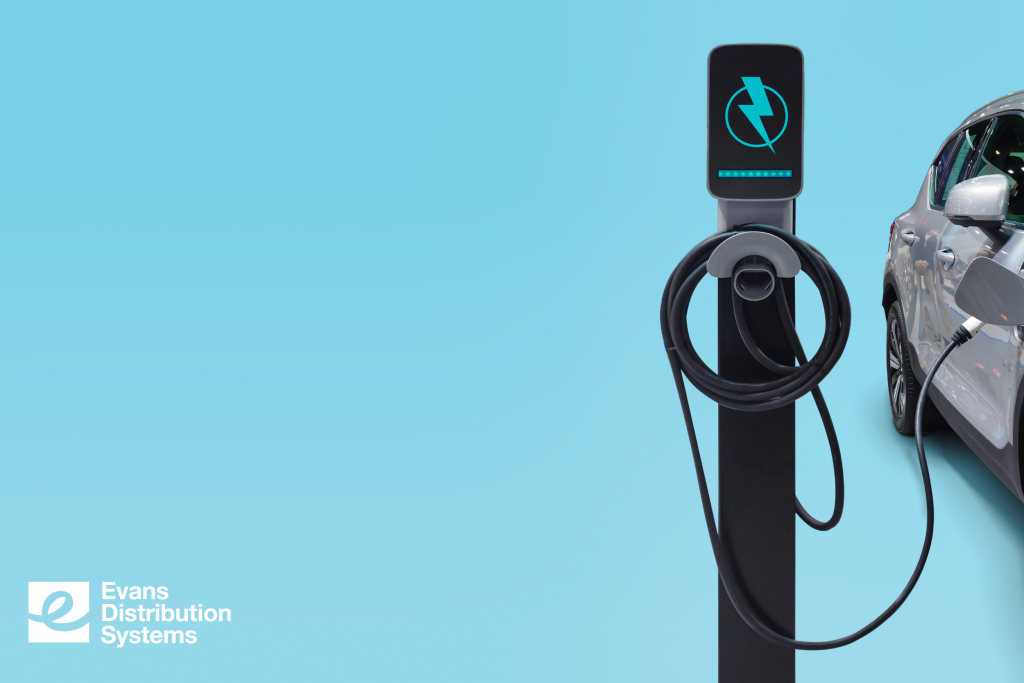
As the shift to electric vehicles (EVs) accelerates, industries are expanding the adoption of electric power beyond consumer cars. The United States, particularly Michigan, is embracing sustainability, driving new carbon emission reduction goals, creating green jobs, and revitalizing the state’s auto industry.
In the second post of our renewable tech and energy series, we will explore how the adoption of electric-powered vehicles is reshaping industries and what it means for the future of logistics and Michigan.
The Role of EVs in Logistics and 3PL
Logistics emissions contribute to at least 7 percent of global greenhouse gas (GHG) emissions. This prompts 3PLs to adopt more sustainable practices across their operations, from warehousing to transportation. In the warehouse, electric forklifts are a key solution, offering significant environmental benefits by producing zero emissions. This reduces harmful exhaust fumes, improving both worker health and the overall air quality. Electric forklifts are also more energy-efficient, which lowers operating costs and reduces carbon footprints.
In transportation, electric semi-trucks and delivery vans with battery ranges exceeding 300 miles on a single charge are making electric trucks increasingly feasible for large fleets. Many companies are pairing EVs with route optimization software to maximize energy efficiency by selecting the shortest routes, which supports their carbon reduction goals.
Electrifying last-mile delivery vehicles is particularly impactful, as these vehicles frequently navigate dense urban areas where emissions directly affect the environment. Companies like Ford and Rivian are designing electric delivery vans specifically for urban and regional distribution. By adopting these vehicles, 3PLs help meet both regulatory and environmental expectations offering eco-friendly services.
Other Leading Sectors
The transition to EVs extends to heavy-duty construction and agricultural equipment, where traditional diesel-powered machinery has long dominated. Companies like Caterpillar and John Deere are now developing electric alternatives for equipment like bulldozers, loaders, and excavators. Electric machines excel in projects with strict emissions regulations, like urban construction sites, requiring quieter, less-polluting equipment. This adoption reduces both air and noise pollution, creating safer environments for operators and communities alike.
Electric agricultural equipment is also on the rise, aiding farmers in sustainable practices by reducing fuel consumption and emissions. This shift aligns with the broader circular economy goals, where sustainable production and minimal waste are central. As the technology becomes more widespread, electric equipment could become the standard in both construction and agriculture.
Boosting Green Jobs and Economic Growth in Michigan
The expanding EV market is poised to revolutionize emissions-heavy sectors like logistics. In states like Michigan, where logistics and distribution are among the top five economic sectors, the growth of electric vehicles presents a significant opportunity for economic growth.
If Michigan fully embraces EVs, it could create up to 56,000 additional auto manufacturing jobs by 2030. This shift would also stimulate the growth of new industries, such as EV charging infrastructure, further boosting the state’s economy.
Battery manufacturers have begun investing billions of dollars into new facilities because of the incentives provided by federal and state governments. Michigan Governor Gretchen Whitmer introduced the Strategic Outreach and Attraction Reserve (SOAR) Fund. Michigan will use this $1.11 billion fund to offer grants and incentives aimed at securing business development deals for the state. The SOAR Fund had an influence on securing investments from Gotion and ONE in the state.
These initiatives to produce more batteries domestically helps reduce the U.S. reliance on foreign battery production and will reduce carbon emissions. By bringing more electric vehicle manufacturing projects to the state, Michigan is becoming the hub for battery production in the U.S.
Evans Distribution Systems stores, repacks, and ships vehicle batteries for automotive manufacturers. We have in-depth expertise in temperature requirements and handling equipment needed to prevent damage while in our care.
Challenges in Full EV Adoption
While the demand for EVs is clear, companies face challenges in adopting electric fleets. One major hurdle is charging infrastructure. For 3PLs and logistics companies, fast-charging stations for large vehicles are essential but still relatively scarce. Government and private investment in EV infrastructure will be critical to supporting widespread EV use across sectors.
Battery technology continues to improve, with research focused on enhancing the range, speed, and power of electric batteries to meet the needs of heavy machinery. Despite these advances, high initial costs can be prohibitive. Long-term savings on fuel and maintenance often offset the upfront costs, with many companies also benefiting from government incentives that lower financial barriers.
Conclusion
As the adoption of electric vehicles (EVs) expands across industries, Michigan stands poised to benefit from this expanding market. From transforming logistics and manufacturing to driving green job growth and technological innovation, the shift to electrification is revitalizing the state’s auto industry while fostering a sustainable future.
As Michigan embraces the electric future, it will serve as a model for other regions, proving that sustainability, economic growth, and innovation can go hand in hand. The road ahead is clear—electric vehicles are not just an opportunity; they are the future of industry, transportation, and the economy in Michigan and beyond.
